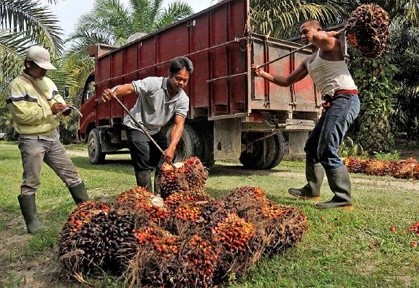Indonesia’s palm oil certification struggling for global recognition
Change Size
 Fresh picks: Workers load fresh oil palm fruit bunches onto a truck. (kompas.com/Iwan Setiyawan)
Fresh picks: Workers load fresh oil palm fruit bunches onto a truck. (kompas.com/Iwan Setiyawan)
I
span ms="" style="font-family:" trebuchet="">Indonesia has been struggling to secure global recognition of its national sustainability standards for the palm oil industry, partly because of fierce competition in the international market, a government official has suggested.
The deputy for food and agricultural coordination at the Office of the Coordinating Economic Minister, Musdhalifah Machmud, said since many European countries wanted to protect their rapeseed oil producers, they were using environmental issues as non-tariff barrier for incoming palm oil products.
"Then they said our Indonesian Sustainable Palm Oil (ISPO) was not 'sustainable enough' for various reasons," she said on Tuesday in a public discussion.
The ISPO is a certification for legal compliance issued by the government. Five years into its implementation, however, it has largely failed to gain market recognition and access to premium European Union markets.
She added that after the government answered their questions, other issues quickly emerged concerning things like the independence of the certification team and child labor. On the other hand, European rapeseed producers have no obligation to obtain sustainability certification at all, she said.
According to Oil World data, about 200 million tons of vegetable oil was produced on the planet in 2015 and palm oil contributed the biggest share with 31 percent, followed by soybean oil and rapeseed with 23 percent and 13 percent, respectively.
As the world's largest producer and exporter of palm oil, Indonesia relies on demand for the commodity, which generates almost US$20 billion a year for the country and employs millions, driving growth and development. (hwa)









